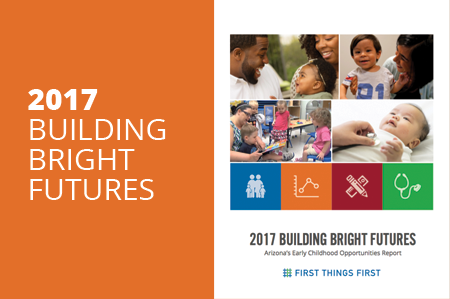
All Arizonans Urged to Do More to Support Health, Education Improvements
PHOENIX – (January 22, 2018) – Almost 1 in 3 young children in Arizona live in poverty, a risk factor for later difficulties, including lower academic achievement. This is just one of the challenges faced by many of Arizona’s almost 550,000 infants, toddlers and preschoolers and highlighted in a new report from First Things First.
Also included in the Building Bright Futures report:
- the population of children birth to 5 in Arizona is expected to grow by 19 percent by 2030;
- 29% of young children in Arizona live in poverty (compared to 24% nationally);
- 34% of young children lack the needed vaccinations (compared to 28% nationally);
- Only 26% of Arizona parents reported they had been asked to complete a developmental screening for their children (on par with national results); and
- 64% of Arizona children don’t attend preschool (compared to almost 47% nationally).
“Ninety percent of a child’s brain growth happens before kindergarten, and early experiences lay the foundation for their success in school and in life,” FTF Chief Executive Officer Marilee Dal Pra said. “This data shows us that too many young kids face challenges in the critical early years that threaten their lifelong success.”
Research shows that children with negative experiences early in life are more likely to drop out of school; become teen parents; suffer from chronic illness; experience unemployment, homelessness or domestic violence; and engage in high-risk behaviors, such as drug use. By contrast, research demonstrates that children with access to high quality early learning are more likely to graduate from high school and enroll in college. As adults, they typically earn more and are less likely to be involved in the criminal justice or social welfare systems.
“So many facets of our community impact young children’s lives – families, schools, businesses, faith communities, and government at all levels. This report not only shows that we can all do more to support young children; it gives us invaluable data with which to inform those decisions,” Dal Pra said.
FTF has posted most of the data in Building Bright Futures on its Data Center, so that stakeholders can access and interact with data most useful to them. This tool enables users to view, sort and map aggregate data related to FTF’s investment in strategies to support the healthy development of Arizona children from birth to age 5. The impact of those strategies includes:
- 54,000 screenings were completed in fiscal year 2017 to detect developmental or sensory issues that can become learning problems later on;
- 925 child care and preschool providers work with FTF’s Quality First program to improve the quality of early learning programs for more than 60,000 young children statewide; and
- scholarships were provided to help 8,800 children access early learning.
“While First Things First is improving outcomes for thousands of young children statewide, we know more needs to be done and no one entity can do it all,” Dal Pra said. “We hope Building Bright Futureswill help community leaders at all levels see the urgent need to support early childhood development and health, and spark community conversations and partnerships that ensure more children in Arizona are ready for school and set for life.”
###
About First Things First – First Things First is a voter-created, statewide organization that funds early education and health programs to help kids be successful once they enter kindergarten. Decisions about how those funds are spent are made by local councils staffed by community volunteers. To learn more, please visit firstthingsfirst.org.

